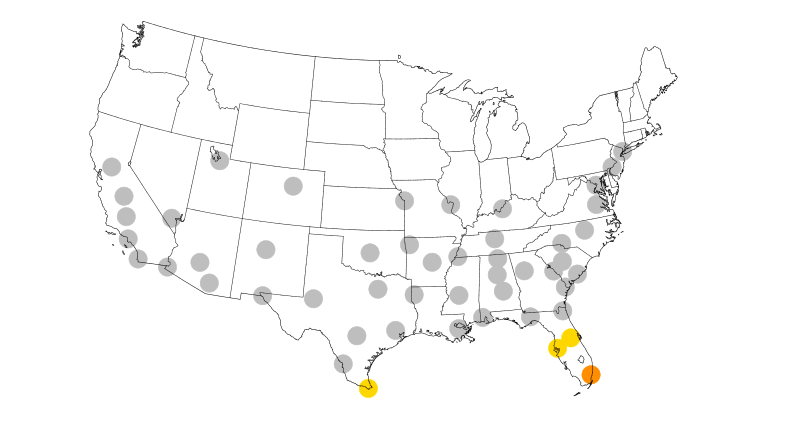These Scientists Called the Zika Outbreak in Miami Months Ago
The Zika outbreak in the Wynwood area of Miami has so far tallied 14 cases, and the CDC has warned people to avoid traveling to the area, the first ever such advisory for the continental U.S.
It’s a worrying development for an outbreak that researchers saw coming. Back in March, Andrew Monaghan of the National Center for Atmospheric Research and colleagues published a study that used computer models to estimate the potential for Zika to crop up in 50 cities around the U.S., based on the seasonal populations of the Aedes aegypti mosquitoes, which can transmit the virus.
At the very top of the list was Miami.

“What we wanted to know was, if the virus is present, where and when are the mosquitoes,” Monaghan said.
Aedes aegypti mosquitoes need sustained warm weather and plenty of precipitation to flourish, so most of the U.S. is safe through the winter, but things get dicey through the spring and summer. Large human population densities also increase chances of an outbreak, as mosquitoes get plenty of opportunity to pick up the virus, and then go on biting people. Areas where people might have less air conditioning, or missing or ripped window screens also upped the risk.
Those factors suggested most of the southern U.S. could be ripe for Zika transmission this summer. Eastern cities as far north as New York also carry some risk. But Miami has a large number of people flying in from Latin American countries where Zika is endemic, giving it a high probability that the virus could be imported.
Public health officials have known this, and have been taking what CDC director Thomas Frieden says are “aggressive” mosquito control measures in and around Miami for the past few weeks. But the mosquitoes, which are excellent at surviving in urban areas, haven’t gone away despite the use of insecticides and attempts to get rid of standing water, where the insects breed.
Officials expect the disease to spread beyond the cases documented so far. How far it will go is hard to predict, Monaghan said, as his team’s work is based solely on extrapolating mosquito populations from a few years' worth of data. But the key is in how the authorities respond. “My sense is this is definitely of concern, but that the public health vector control response will be very strong and may limit extent of Zika transmission,” he says.
(Read more: New York Times, NCAR, “First Zika Vaccine Will Be Tested in Humans Sooner Than Expected,” “The New Mosquito Menace”)
Keep Reading
Most Popular
Large language models can do jaw-dropping things. But nobody knows exactly why.
And that's a problem. Figuring it out is one of the biggest scientific puzzles of our time and a crucial step towards controlling more powerful future models.
The problem with plug-in hybrids? Their drivers.
Plug-in hybrids are often sold as a transition to EVs, but new data from Europe shows we’re still underestimating the emissions they produce.
Google DeepMind’s new generative model makes Super Mario–like games from scratch
Genie learns how to control games by watching hours and hours of video. It could help train next-gen robots too.
How scientists traced a mysterious covid case back to six toilets
When wastewater surveillance turns into a hunt for a single infected individual, the ethics get tricky.
Stay connected
Get the latest updates from
MIT Technology Review
Discover special offers, top stories, upcoming events, and more.